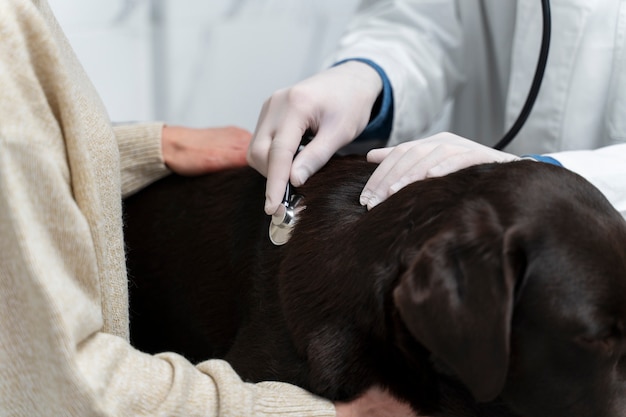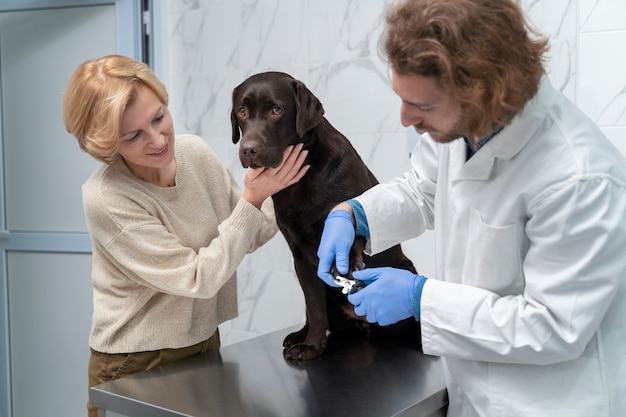When to Seek a Veterinary Oncologist for Your Pet’s Lymph Node Swelling


When to Seek a Veterinary Oncologist for Your Pet’s Lymph Node Swelling
As a devoted pet owner, noticing swelling in your dog’s or cat’s lymph nodes can be both alarming and confusing. Lymph node enlargement often prompts questions about whether it’s a minor infection or something more serious, such as cancer. At Veterinary Cancer Health, located at 4101 Turtle Creek Drive, Coral Springs, FL 33067, our specialized veterinary oncology team is dedicated to guiding you through the next steps with compassion and expert care. This blog will help you understand the potential causes of lymph node swelling in pets, how veterinary oncologists approach diagnosis and treatment, and when it’s time to seek specialized care for your companion.
If you are searching for an "oncology vet near me" or need advanced cancer diagnostics for your pet in Coral Springs and surrounding communities, you are not alone. Many pet owners turn to veterinary oncologists for guidance when faced with these concerns. In this article, we will explore what lymph node swelling could mean, how a veterinary oncology specialist at Veterinary Cancer Health can help, and what local pet cancer care options are available, including comprehensive cancer diagnosis and staging in Coral Springs.
Recognizing Lymph Node Swelling in Pets: When Should You Be Concerned?
Pet lymph node swelling can be subtle or quite noticeable, depending on the location and severity. Some pet owners discover a lump under the jaw, near the shoulders, or behind the knees while grooming or petting their animal. Others may notice swelling only after their pet seems lethargic or develops other concerning symptoms.
Key signs to watch for include a firm or soft lump that was not present before, swelling that appears suddenly or grows rapidly, and areas that feel warm or tender to the touch. Additionally, pets may show signs such as decreased appetite, weight loss, difficulty swallowing, or general fatigue. These symptoms can be alarming, especially when paired with visible swelling in areas where lymph nodes are located.
It is important to pay attention to changes in your pet’s behavior or physical appearance. If you notice unusual lumps or swelling, particularly in the neck, underarms, groin, or behind the knees, this warrants prompt veterinary attention. While some lymph node enlargement may be due to benign causes like infections or inflammatory reactions, persistent or unexplained swelling could indicate underlying cancer. Understanding when to see a veterinary oncologist is essential for early intervention and peace of mind.
What Causes Lymph Node Swelling in Dogs and Cats?
Lymph nodes play a vital role in your pet’s immune system, acting as filters that trap and destroy bacteria, viruses, and abnormal cells. When lymph nodes swell, it is often a sign that the body is responding to an infection, inflammation, or more rarely, cancer.
Common causes of lymph node swelling in pets include bacterial or viral infections, allergic reactions, and localized inflammation from wounds or dental problems. However, one of the most significant concerns is the possibility of cancer, especially lymphoma, which is one of the most common cancers in both dogs and cats. Lymphoma often presents as painless, firm lymph node enlargement and may be accompanied by other symptoms such as lethargy, weight loss, or decreased appetite.
In some cases, other types of cancer can metastasize to lymph nodes, leading to swelling. The only way to determine the cause of pet lymph node swelling cancer is through professional veterinary diagnostics. Veterinary oncologists in Coral Springs use advanced tools such as biopsy and cytology, imaging studies, and molecular analysis to accurately identify the underlying issue and guide treatment decisions.
How Veterinary Oncologists Diagnose and Treat Lymph Node Swelling in Coral Springs
When your pet is referred to a veterinary oncology specialist for lymph node swelling, the first step involves a thorough examination and detailed medical history. At Veterinary Cancer Health, our team of veterinary oncologists in Coral Springs begins with advanced diagnostic tools to pinpoint the cause of the swelling.
The diagnostic process often includes fine needle aspirates or biopsies of the affected lymph nodes. This allows our veterinary professionals to examine the cells under a microscope to determine if cancer is present. Further testing, such as DNA sequencing and molecular analysis, can provide in-depth information about the specific cancer type and help tailor the most effective treatment plan for your pet.
Imaging techniques such as ultrasound, digital radiographs, or CT scans are often used to assess whether cancer has spread to other organs. If a cancer diagnosis is confirmed, treatment options at our oncology clinic in Coral Springs may involve chemotherapy, targeted therapy, or immunotherapy, depending on the specific diagnosis and your pet’s needs. For example, chemotherapy and medical treatments are commonly recommended for lymphoma and other cancers that respond well to systemic therapies.
Our veterinary oncology team is committed to collaborating with your primary care veterinarian, ensuring that your pet receives seamless, comprehensive cancer care near you. Throughout treatment, we provide ongoing monitoring, recheck exams, and adjustments to therapy plans as needed, always prioritizing your pet’s comfort and quality of life.
What Can Pet Owners Do at Home? Steps to Support Your Pet’s Health
While the expertise of a veterinary oncologist is crucial for diagnosing and treating cancer-related lymph node swelling, pet owners also play an important role in supporting their companion’s wellbeing at home. The most important step is to remain observant for any new lumps, swelling, or changes in behavior. Early detection can make a significant difference in treatment outcomes.
If your pet is undergoing cancer treatment, follow all recommendations from your veterinary oncology team regarding medication administration, dietary adjustments, and activity restrictions. Keep a journal of any changes in symptoms, appetite, or energy levels, and report these to your veterinarian during follow-up visits. Providing a calm, stress-free environment and ensuring your pet’s comfort are also essential during recovery and treatment.
It is important to remember that while home care can support your pet’s wellbeing, any new or persistent swelling should always be evaluated by a veterinary professional. Attempting to treat or diagnose lymph node swelling at home can delay life-saving care. If you have questions about potential cancer symptoms or about "when to see a veterinary oncologist," reach out to a specialist promptly for guidance.
When Should You Seek Veterinary Oncology Care for Lymph Node Swelling?
Knowing when to seek a veterinary oncologist for your pet’s lymph node swelling is vital for early detection and successful treatment. You should schedule a consultation with a veterinary oncology specialist if you notice persistent or unexplained swelling in one or more lymph nodes, especially if the swelling lasts longer than a week or is accompanied by symptoms such as weight loss, loss of appetite, lethargy, or difficulty breathing or swallowing.
If your primary care veterinarian has identified abnormal lymph node enlargement or suspects cancer, they may refer you directly to a specialty clinic such as Veterinary Cancer Health for advanced diagnostics and treatment. Our oncology team in Coral Springs specializes in the evaluation and management of pet lymph node swelling cancer cases, offering state-of-the-art care and compassionate support throughout the process.
For those seeking an "oncology veterinarian near me" or "specialist vet near me" in Coral Springs, our clinic is equipped to provide tailored cancer care for your pet. We offer second opinions and case reviews for pet owners who want to ensure they are pursuing the most appropriate course of action; you can access these services through our second opinions and case reviews resource.
Take Action for Your Pet’s Health: Contact Veterinary Cancer Health in Coral Springs
If you are concerned about pet lymph node swelling cancer or are unsure about when to see a veterinary oncologist, the team at Veterinary Cancer Health is here to help. We encourage you to reach out for a consultation if you notice persistent swelling, lumps, or other concerning symptoms in your dog or cat. Early evaluation by an oncology vet near me can make all the difference for your pet’s prognosis and quality of life.
Our veterinary oncology professionals in Coral Springs offer advanced cancer diagnostics and customized treatment plans, working closely with you and your primary care veterinarian every step of the way. Whether you are seeking pet cancer diagnosis in Coral Springs, need ongoing cancer care, or are looking for guidance on managing complex cases, our compassionate team is committed to supporting you and your companion.
To schedule an appointment or learn more about our services, call (195) 459-28504 today. You can also visit our clinic at 4101 Turtle Creek Drive, Coral Springs, FL 33067 for expert cancer care. If you would like more information about our comprehensive cancer diagnosis and staging or have questions about your pet’s specific needs, please reach out to our veterinary oncology team.
Your pet’s health is our priority. If you are searching for a specialist vet near me for cancer diagnostics, treatment, or a second opinion, Veterinary Cancer Health in Coral Springs is ready to provide the advanced, compassionate care your pet deserves.
This article is intended for informational purposes only and does not replace professional veterinary advice. Always consult a veterinary oncology specialist if you are concerned about your pet’s health.

.png)















